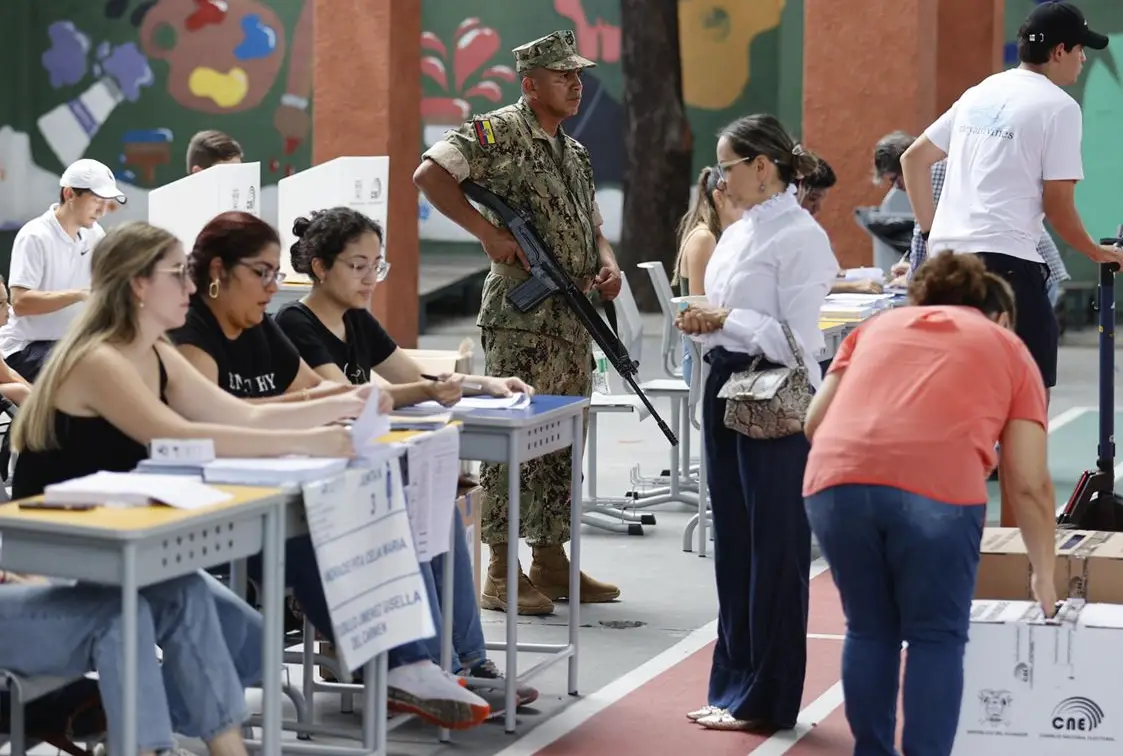On April 13, Ecuador will return to the polls to elect a presidential ticket between two opposing proposals: 21st-century socialism, represented by Luisa González of the Citizen Revolution and heir to former President Rafael Correa, versus the right-wing party National Democratic Action (ADN), led by Daniel Noboa Azín, son of billionaire banana magnate and former presidential candidate Álvaro Noboa. This is the first time in the country’s republican history that there has been such a close first-round result: 44.16% for Noboa and 43.99% for González.
Although this is the first time since 2007 that the Citizen Revolution will enter a runoff election without leading in the first round, it has surpassed its previous voting ceiling, placing it in a new electoral scenario. Meanwhile, incumbent President and candidate Noboa has managed to maintain his electoral appeal despite a year in office marked by problems of all kinds, particularly insecurity, violence, and unemployment. January recorded the highest number of violent deaths, with 750 cases—a 45.04% increase compared to the same period in 2024.
The two candidates reflect a regional divide in voting patterns. The coastal region has historically favored Rafael Correa’s party, the Andean highlands have supported anti-correísta candidates, and the Amazon region remains split. Both finalists are seeking alliances with Leonidas Iza, leader of the Indigenous movement, which secured 5.3% of the vote in this election—525,885 ballots, a significant number that could break the tie in the runoff, despite Ecuador’s non-transferable vote system. Aside from Andrea González, who garnered 2.7%, all other candidates failed to reach even 1% of the vote.
By way of background, it is worth mentioning that Leonidas Iza has led Ecuador’s most significant protests, including those in October 2019 and June 2022. His political platform symbolizes resistance to capitalism, opposition to international financial institutions, environmental advocacy, tax collection from delinquent debtors, and the promotion of a popular and solidarity-based economy. At first glance, these positions do not align with either candidate, making any negotiations with this Indigenous leader highly complex.
The runoff election will present contrasting visions on multiple issues. In foreign relations, Luisa González supports Latin American integration and closer ties with self-proclaimed progressive governments in the region, whereas Noboa favors a pro-Donald Trump stance. In economic policy, the candidates differ between a state-led regulatory approach and a public-private partnership model. On security, Noboa promotes a hardline crackdown on crime, while González advocates tackling organized crime through social policies.
Noboa’s campaign has centered on fighting organized crime and rejecting the “old politics,” which he associates with traditional parties and leaders. Meanwhile, Luisa González has framed her proposal around a social agenda with strong references to Rafael Correa’s administration. Despite these defined positions, both candidates are expected to adjust their messaging, as neither secured enough votes to win outright in the first round. They have also announced plans to intensify their on-the-ground efforts in key localities while expanding their digital campaign strategies.
A major goal for both candidates is voter mobilization in the runoff election, considering a first-round absentee rate of 17%, along with 6.7% null votes and 2.6% blank ballots, according to the National Electoral Council. The campaign has overshadowed legislative developments, as the current National Assembly nears the end of its term. The private sector and civil society are also closely monitoring the potential outcomes and their implications.
The next administration’s governability will depend on executive-legislative relations. For the first time since Ecuador’s democratic transition in 1979, two dominant political forces will shape the legislature, though neither holds an absolute or qualified majority in the 151-seat Assembly. The winning candidate will need to negotiate with other party legislators and independents to secure a legislative majority necessary for passing key reforms on state governance, job creation, and combating drug trafficking.
The challenges facing the next president are immense: insecurity, unemployment, and the fight against corruption and impunity. In this regard, Ecuador ranks 121st out of 180 countries in Transparency International’s latest corruption index, on par with Angola and Kenya. The country has dropped two points from the previous year, and corruption has ranked among Ecuadorians’ top four concerns in national polls over the past two years.
*Machine translation proofread by Ricardo Aceves.












